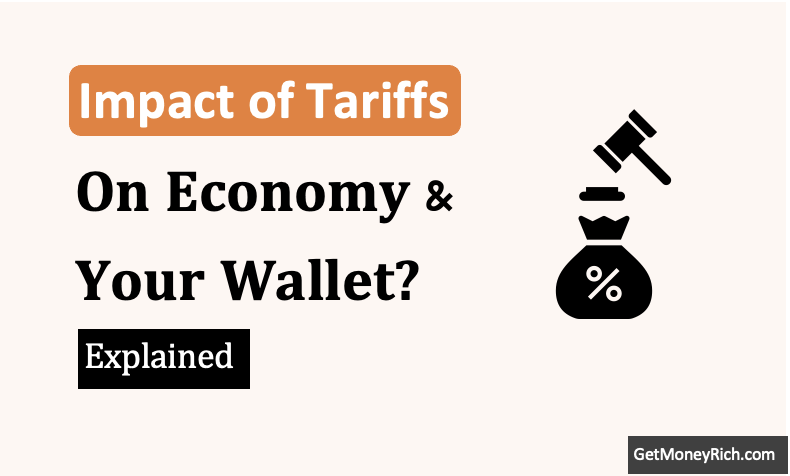I was Listen to this podcast The other day from Goldman SachsAnd it got me thinking about something we’ve all been about lately: tarifsYou know, those Extra Taxes Slapped on Stuff Us Import from Other Countries? They’ve been all over the news, and honestly, it’s hard to keep up with What it all means for us regular peopleThe podcast is loaded with Economist jargon and fancy forecastsSo I thought, why not declutter it down and present it in a way that actually makes sense for people like me and you.
Why undersrstanding this podcast is important? Because the stuff in it (About Trump’s tariffs) Affects our wallets, our jobs, and even the pris at the Grocery Store. So allow me to present a simpler interpretation (my) of this otherwise complicated podcast.
Tarifs are here
I’m imagining it like this, it’s early 2025, and the US government has decided to crank up tarifs.
We’re Talking about a jump that’s like adding a 10% Extra Tax on a ton of Imported GoodsThe tax will be on everything from car parts to clothes to maybe even your next phone.
Initially, experts thought it’d be a smaller hike, maybe 4-5%, but nope, the new administration is going big. Why?
Well, there’s talk about ”reciprocal tarifs“(If another country taxes us, we tax them back) and protecting” Critical imports “like auto parts. Even canada and mexico got hit with some of these, which surprised Everyone Since they’re our neighbors.
So, what’s the deal?
It’s like the government’s saying, “We’re tired of playing nice, let’s make imported stuff more expensive so people Buy American Intead.,
Sounds Simple, Right? But here’s where it gets messy for us.
Price are going up (Inflation Again)
Let’s talk about the elephant in the room, inflation.
Everything from gas to groceries have been pricier lately, it is not an assumption, it is a fact. The Goldman Sachs Podcast threw out some numbers, if there was no tarifs, they’D expect inflation to drop to Around 2.1% By the end of 2025. Nice, Right? But with these new tarifs? They’re betting it’ll climb to almost 3%,
That might not sound like a lot, but trust me, these are average numbers. Inflation experienced by essential items will be much higher. In a country, where average inflation, before covd was beLow 2%. If it starts climbing to 3%, it will hurt many more than we think.
Tarifs are like a hidden tax that gets passed down to you. Say you’re buying a new jacket from overseas. The company importing it now to pay more to brings it in, so they jack up the price to cover it. Suddenly, that $ 50 jacket is $ 60.
Multiply that Across Tons of Stuff, Shoes, Electronics, Even Car Repairs, and Your Budget’s Taking a Hit.
In the podcast, david said, this is a “one-time” price bump, not a forever thing, but here’s the problem, people are already freedy freaking out about it.
Businesses and shoppers are so tuned into tariff news that they’re expecting price to keep rising, which could make things things.
Growth’s Taking a Dip
Here’s the flip side. While prises go up, the economy might slow down.
In the podcast, they are forecasting a slower growth rate for 2025 from 2.2% to 1.7%. Simply Speaking? The us isn’t going to grow as fast as they thought.
Why? Well, tarifs messes with things in a few ways:
- Less money in your pocket: Higher prices mean you’ve got less cash to spend on other stuff, like eating out or that weekend getaway.
- Shaky Markets: Wall street’s not loving this uncertainty. Stocks Dip, and that can spook businesses.
- Businesses Get Nervous: Companies Hate Not Knowing What’s Next. Will Tarifs Get Worse? Will other countries fight back? So, instead of building new factors or hiring more people, they sit tight.
David, in the podcast, mentioned stagflationIt is a scary word that means high prices and a sluggish economy. But he was quick to say, “Chill, it’s not the 1970s.” Back then, Uneprement was crazy, and inflation hit double digits. This? It’s more like a speed bump than a crash.
Still, Growth Slowing from 2.2% to 1.7% means fewer jobs and less buzz in the economy. Not great, but not a disaster, yet.
Recession Vibes?
In the podcast, experts bumped their Recession odds form 15% to 20%,
That’s still pretty low, like a one-in-fit chance it’ll rain this afternoon. They’re not sweet Always Dial Back The tariffs If things get ugly.
But here’s what got my attentionPresident Trump Didn’t Exactly Brush off the Recession Talk. He was more like, “Eh, I don’t wanna think about it.” That’s a shift from his first term when he was all about keeping things rosy for voters.
It’s like the government’s rolling the dice a bit more this time. They’re willing to risk some economic bumps to push their “America first” plan.
Will it pay off? Hard to say, but it’s definitely keeping Everyone on edge.
What’s the fed gonna do?
The Federal Reserve, Who Control Interest Rates, are not going to sit quite. But for sure they’re in a tricky spot.
Normally, if inflation’s low, they might cut rates to give the economy a boost. But with tarifs pushing pris up to 3%, that’s tougher. The podcast said the fed’s still Planning two rate cuts in 2025, but it’s not a sure thing anemore,
Here’s why it matters to common people? If they do’t cut rates, borrowing money, for a house, a car, or even your credit card, Stays Expected. If they do cut, it’s probally became the economy’s looking shaky, and they’re trying to softten the blow (like they did in 2019 when tarifs got hairy).
Eather way, they’re watching this tariff messes like Hawks, Waiting for Clearer Signals.
Uncertainty is the real killer
One thing that kept popping up in the podcast? Uncertainty.
Businesses Hate it.
Imagine you’re a company thinking about opening a new store. Then the tariffs hit, costs go up, and oh, maybe canada’s taxing your expenses back. Would You Risk It? Probably not.
David said this time’s WorsE than 2019 if the tariffs are bigger and hit more countries. Back then, it was mostly China. Now? IT’s Everyone, and they might all fight back.
For us, that means companies might hold off on hiring or building stuff, which Slws Everything Down. Even if the tariffs do’t get WorsE, just the Threat of them Block Make Businesses Play It Safe. And when they do that, I feel, it will cause fewer jobs, less innovation, Slower Growth.
What to watch for
So, What’s Next? The Podcast Gave Some Clues About What they’re keeping an eye onAnd i think we shouldon too:
- Business confidence: If companies start feeling gloomier, they’ll cut back on spoiling and hiring. Surveys next month will tell us a lot.
- Jobs: Hiring’s been strong in healthcare and government jobs, but if tariff uncertain (or spending cuts) Hits, that could change.
- Investment: Businesses have alredy been skimpy on new projects. More Tariff Drama Cold Make It WorsE.
The Good News? We’re not starting from a terrible spot.
Confidence was Decent Before This Latest Tariff Wave, And We’re Not as Spoked as We We WERE DURING SOSE RESE RECESSION SCARES A Few Years Back.
But yes, the next few months could get bumpy.
Conclusion
How do you deal with this?
- FirstBrace for Higher prices, Maybe Start Hunting for Deals or Sticking to Local Brands If Imports Get Too Pricey.
- SecondKeep an eye on your job or industry. If you’re in manufacturing or retail, tariffs could shake things up.
- ThirdDon’t freak out about a recession just yet, it’s not a don deal.
For me, this whole tariff Thing feels like a big Experiment,
The Government’s Betting It’ll Boost American Jobs and Companies, but it’s a gamble,
Price Might Sting for a While, and Growth Cold Stall, But IF they Pull IT Off, Maybe We’ll See More “Made in the USA“Tags.
What do you think, Worth the risk, or too much hassle? I’d love to hear your take.
Keep reading and keeping looking at the developments closely.
(Tagstotranslate) Inflation and growth

